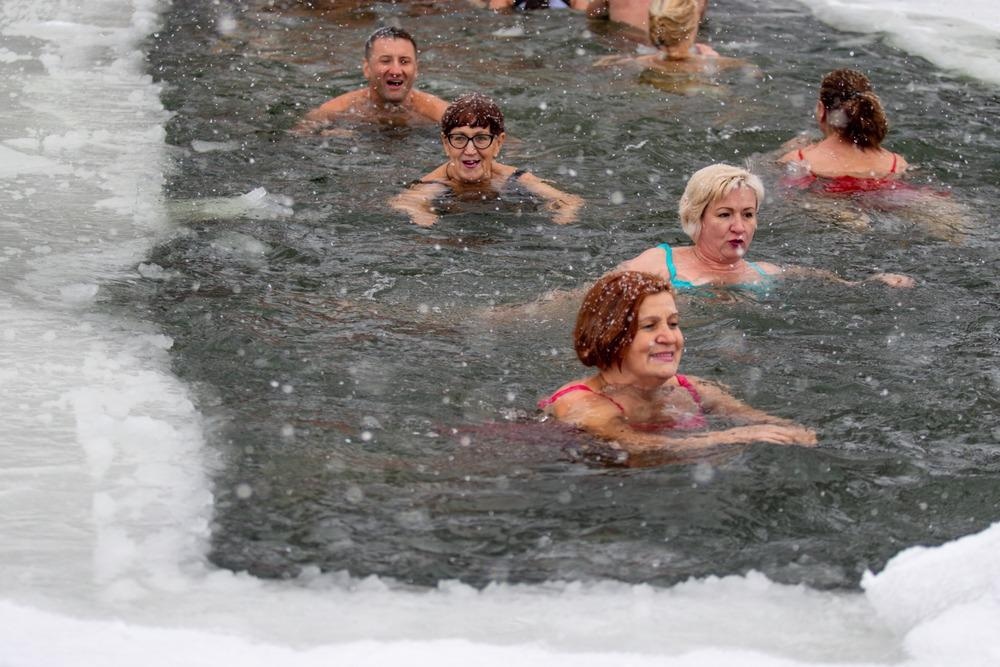There is a long history documenting the benefit of cold therapy for human health. Cold water therapy is the practice of using cold water to treat a range of health conditions. The effects of cold water exposure, either by swimming or taking cold showers or baths (4-10°C) are currently being researched, particularly in the Northern hemisphere.
Cold therapy has been researched most actively in psychiatry. Until the 1980s, psychiatric patients were wrapped in cold, wet sheets to calm agitated patients and sensitize patients assessed to be unresponsive or apathetic.
More recently, cold water therapy has re-entered psychiatric medicine in several forms. Of them, bathing in cold water involves temperatures between 0-15°C, or lower when the water is salted. Research relating to its therapeutic effects has been researched in both academic and non-academic settings.

Image Credit: rangizzz/Shutterstock.com
What Happened to the Body When Exposed to Cold Water?
During cold therapy, the cutaneous thermoreceptors are stimulated; this, in turn, results in the stimulation of the thermoregulation center in the hypothalamus. The thermoregulatory system operates to maintain a constant core temperature of ~37°C When exposed to cold water the constriction of the blood vessels supplying blood to the periphery (vasoconstriction) and shivering, results in the generation of heat by muscle contraction; this additionally increases the metabolic rate.
Moreover, heart rate is decreased, and blood pressure (both diastolic and systolic) is elevated. In cases of extreme cold exposure, the direct skin-cooling effect is felt most severely in the extremities, which may result in a temperature difference of up to 10°C relative to the core temperature. This temperature difference is dependent on a range of factors and includes age, gender, and BMI.
Notably, however, cold water therapy has negligible effects on the core temperature; somatic benefits are subsequently attained without the risk of adverse, or life-threatening effects as homeostatic mechanisms are maintained.
The Benefits of Cold Water Therapy
There are numerous benefits to cold water therapy which range from the treatment of pain and depression, through increased athletic performance and endurance to improvements in the function of several systems such as the immune, cardiovascular, and metabolic systems.
Cold water therapy is effective in several autoimmune diseases which include multiple sclerosis, ankylosing spondylitis, and rheumatoid arthritis. Autoimmune diseases are examples of chronic inflammation. Research has shown that cold water therapy reduced complaints of somatic pain in patients with autoimmune disease. This is thought to be a result of a decrease in cellular microinflammation through a reduction in pro-inflammatory cytokines and oxidative stress.
Cold water therapy is a practice that is well-established in the sporting setting; there are several studies on the effects of cold water therapy on physical recovery after sports activities, in particular, exercise-induced muscle damage (EIMD). A Cochrane review concluded that cold water therapy induces a positive effect on the recovery of muscles following exercise.
In addition, the effects of cold water therapy have been studied extensively in several sports including kayaking, volleyball, athletics, basketball, and swimming. Studies of cold-water therapy in these sports have shown a performance improvement; relative to control groups, those treated with cold water therapy showed increased exercise capacity, a more regular circadian rhythm, decrease tiredness, improved quality of sleep, and lower levels of proinflammatory size accounts as well as a decrease in oxidative stress.
The beneficial effects of increased quality of sleep and sleep efficiency or desirable characteristics in the case of psychiatric disorders. Moreover, the improvement in circadian rhythm seen in sports studies has also been shown to mediate mood enhancement. Therefore cold water therapy can enhance cognitive mood.
In terms of endocrinal effects, cold water therapy has been found to increase hormones, such as ACTH, norepinephrine, and catecholamine. Norepinephrine has been implicated in reduced pain perception – although habituation has been observed; adaptation through continuous exposure to cold water weakened the physiological response and prevented the release of catecholamines.
Cold water therapy has also demonstrated a positive impact on insulin metabolism. Female swimmers and swimmers with a low body fat percentage experience increased sensitivity to insulin and experience a lowered resistance to insulin, as well as reduced level of insulin secretion.
Ultimately, cold water therapy has been shown to induce positive health effects in healthy humans. Cold water therapy has positive implications in the management of pain, the strength of the immune system, and combating mental health issues. Cold water elicits different effects on several systems in the body. Although there are studies to suggest a correlation between these positive effects, there is a lack of evidence concerning the mechanistic basis of these correlative links.

Image Credit: kzww/Shutterstock.com
References:
- Mooventhan A, Nivethitha L. (2014) Scientific evidence-based effects of hydrotherapy on various systems of the body. N Am J Med Sci. doi:10.4103/1947-2714.132935.
- Knechtle B, Waśkiewicz Z, Sousa CV, et al. (2020) Cold Water Swimming-Benefits and Risks: A Narrative Review. Int J Environ Res Public Health. doi:10.3390/ijerph17238984.
- Higgins TR, Greene DA, Baker MK. (2017) Effects of Cold Water Immersion and Contrast Water Therapy for Recovery From Team Sport: A Systematic Review and Meta-analysis. J Strength Cond Res. doi:10.1519/JSC.0000000000001559.
Further Reading
Last Updated: Jan 24, 2022